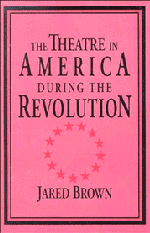Book contents
- Frontmatter
- Contents
- Preface
- Prologue
- SETTING THE STAGE: BEFORE THE REVOLUTION
- 1 The Drama of the Approaching Revolution
- 2 British Military Theatre, 1775–1777
- 3 Miscellaneous Diversions: Philadelphia, 1778
- 4 American Military Theatre and “Entertainments,” 1778
- SETTING THE STAGE: BRITAIN ASCENDANT
- SETTING THE STAGE: AMERICA ASCENDANT
- SETTING THE STAGE: AMERICA TRIUMPHANT
- Epilogue
- Appendix
- Notes
- Bibliography
- Index
2 - British Military Theatre, 1775–1777
Published online by Cambridge University Press: 29 September 2009
- Frontmatter
- Contents
- Preface
- Prologue
- SETTING THE STAGE: BEFORE THE REVOLUTION
- 1 The Drama of the Approaching Revolution
- 2 British Military Theatre, 1775–1777
- 3 Miscellaneous Diversions: Philadelphia, 1778
- 4 American Military Theatre and “Entertainments,” 1778
- SETTING THE STAGE: BRITAIN ASCENDANT
- SETTING THE STAGE: AMERICA ASCENDANT
- SETTING THE STAGE: AMERICA TRIUMPHANT
- Epilogue
- Appendix
- Notes
- Bibliography
- Index
Summary
The first theatrical performances given by the British military in America were offered in Boston in 1775 and 1776. After the passage of more than two hundred years, our knowledge of these productions is skimpy at best. Only a handful of references to them, hinting at the nature and extent of the theatre in Boston during the Revolution, has survived. Still, the performances in Boston are significant because they were the first of more than one hundred sixty that would be presented by the British military in America.
Boston, 1775–1776
Throughout the spring, summer, and fall of 1774, British troops poured into Boston. Most Bostonians were irritated by the mere arrival of the troops, but when cold weather came on and the revised Quartering Act was effected (specifying that any British officer could force any Bostonian to provide lodging for the king's troops in his home), irritation turned to outrage. To make matters worse, many of the occupying soldiers treated their hosts arrogantly, prompting some Bostonians to adopt the rebels' cause.
On April 18, 1775, Paul Revere made his famous ride from Boston to Cambridge to Lexington, and halfway to Concord, spreading the news that the British were about to attack in force. On the next day, the British army was met by two American militia companies. Although the British soldiers were ordered “on no account to Fire or even attempt it without orders,” someone – no one knows who – did fire, and the Revolution had begun.
- Type
- Chapter
- Information
- The Theatre in America during the Revolution , pp. 22 - 44Publisher: Cambridge University PressPrint publication year: 1995



